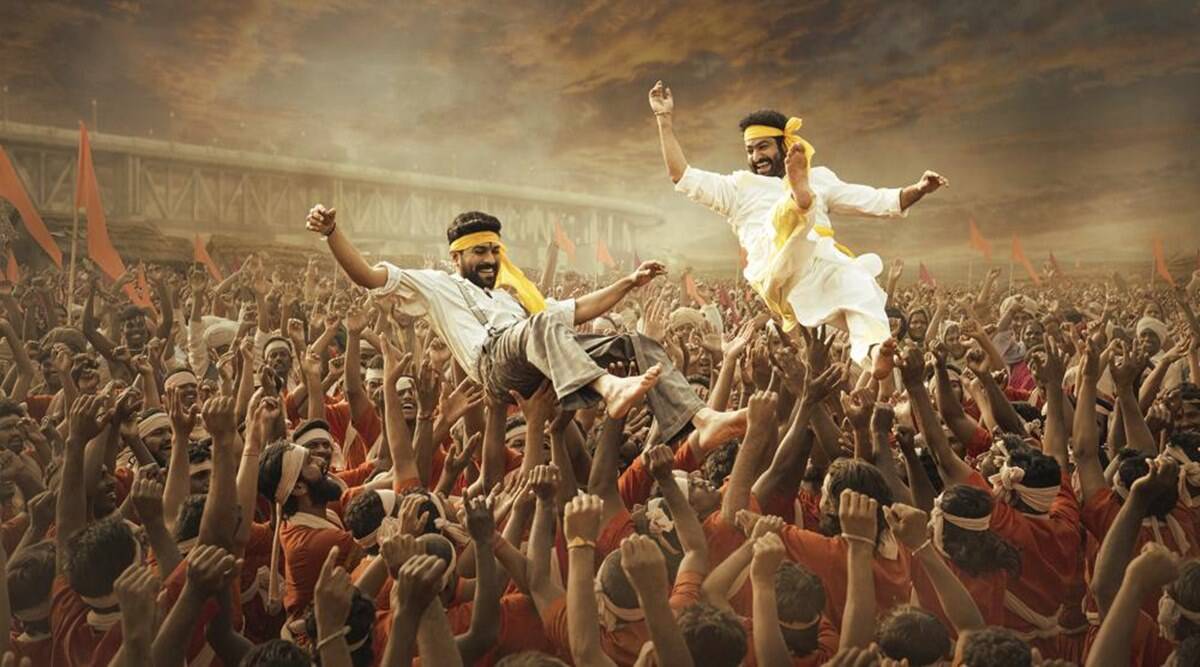 The brouhaha over a British history professor’s unfavourable review of the SS Rajamouli blockbuster RRR, which is set in the early 20th century when India was still a colony, seems overblown. (Netflix via AP)
The brouhaha over a British history professor’s unfavourable review of the SS Rajamouli blockbuster RRR, which is set in the early 20th century when India was still a colony, seems overblown. (Netflix via AP)At the 68th Academy Awards in 1996, the historical war drama Braveheart picked up the night’s two big awards — Best Picture and Best Director for Mel Gibson, who also played the lead role of 13th century Scottish rebel leader, William Wallace. Never mind that the film had been roundly panned by historians for being inaccurate on several counts — from the blue paint that Wallace and his followers wore on their faces (about a 1,000 years after the Picts had actually worn it to fight off the Romans) to depicting Wallace as having picked up arms against the English because they had murdered his wife. Many detractors argued that the film even got its name wrong: “Braveheart” was the term used to describe King Robert the Bruce, not Wallace.
For a movie-going audience, however, burly men with blue face paint and clad in kilts (also historically inaccurate) going to war over a dead woman makes for a far more compelling story than the actual events. Even the name of the film, accurate or not, is enticing. They’re not at the movies for a history lesson — they’re there to be entertained. One could argue that the whole point of a film – particularly if it is a mainstream fiction entertainer – is to tell a compelling story. Facts, even if relevant, be damned. Which is why the brouhaha over a British history professor’s unfavourable review of the SS Rajamouli blockbuster RRR, which is set in the early 20th century when India was still a colony, seems overblown.
In his now-viral review, Robert Tombs complains that RRR “slanders” the British by showing them “roaming the country casually committing crimes”, calling it “a sign of absolute ignorance or of deliberate dishonesty”. To him, it’s just another “nationalist myth” where the British are “cast in the role of villains” because “It’s a way that quite a few countries make up heroic stories about themselves.” Not surprisingly, Indian social media blew up with counter-accusations of the “deep denial” of colonial crimes by yet another “white boy” with even Winston Churchill, predictably, being dragged into the controversy.
All the noise aside, though, the question of whether or not filmmakers have a duty to historical accuracy is important, and one that comes up repeatedly. But it is one that can only be answered if we know that a particular filmmaker, when making a movie set during a specific period of history, makes a claim to accuracy. This Rajamouli has expressly not done. Even before RRR’s release, he had said in interviews that there are no historical facts in his film, only imagination, his biggest liberty being the depiction of the friendship between Komaram Bheem and Alluri Sitarama Raju, two men who, in real life, had never even met. Perhaps Rajamouli believes his duty is towards his audience, making sure that they are entertained, and towards his producers, doing his best to help them make money. Does it matter, then, that he’s shown the British as being more villainous than they actually were?
Subscriber Only Stories
Never mind fiction, facts are not sacred even in documentary cinema. Documentaries, it must be remembered, are not so much real life as caught on camera as they are a representation of a particular person’s view of events and/or people. As German filmmaker Werner Herzog wrote in his manifesto, The Minnesota Declaration: Truth and Fact in Documentary Cinema, “Facts cannot be underestimated as they have normative power. But they do not give us insight into the truth, or the illumination of poetry.” Rajamouli’s historical epic, with heroes who perform physics-defying stunts and a tiger that cowers when a human being roars back at it, is obviously not a documentary film. But it does offer an insight into a truth: If a film that is designed to simply please its audience achieves this end, demanding that it also be faithful to historical facts is a fool’s game.
pooja.pillai@expressindia.com
- The Indian Express website has been rated GREEN for its credibility and trustworthiness by Newsguard, a global service that rates news sources for their journalistic standards.

